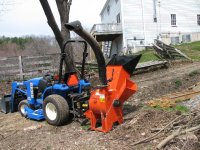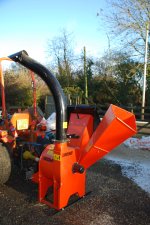niemeyjt
Gold Member
One of the many interesting things on TBN is the exchange of ideas and information between the posters from the different continents - so I thought I would run this one by you all for thoughts as a safety matter - I hope you do not feel an open discussion like this will dilute the message of a safety forum - if it does I am sure a mod will move it.
Attached are two photos of a Bearcat 73554 chipper shredder - one is Hazmat's (I hope he does not mind me using his photo, and I would like to thank him for his postings which guided me to my choice), the other is mine. Spot the difference (other than the blue / orange on the front)!
Clue - mine has the European feed extension that elongates the feed chute so I cannot put my hand down and touch the moving blades. It also means that I have to feed much straighter wood in, and wood without side branches, as otherwise it fouls the top of the feed chute. I also have to lift it higher.
In a similar vein, my wood splitter has two handles both of which have to be depressed to operate it so that (unless you have three arms) you cannot operate machine with a hand in front of the wedge. It also means you cannot use one hand to steady a log and stop it rolling off.
So my questions for your thoughts:
Do you think American-market (and maybe others?) products adequately protect the user or do you think that additional guards and controls like those fitted to European tools should be legislated for and fitted in all markets even if the cost does go up and functionality goes down?
Do you think that European-market products are overkill on the safety to the detriment of the operation of the machine where common sense should / would dictate that you don't feed you hand into a chipper or splitter?
Regards,
Julian
Attached are two photos of a Bearcat 73554 chipper shredder - one is Hazmat's (I hope he does not mind me using his photo, and I would like to thank him for his postings which guided me to my choice), the other is mine. Spot the difference (other than the blue / orange on the front)!
Clue - mine has the European feed extension that elongates the feed chute so I cannot put my hand down and touch the moving blades. It also means that I have to feed much straighter wood in, and wood without side branches, as otherwise it fouls the top of the feed chute. I also have to lift it higher.
In a similar vein, my wood splitter has two handles both of which have to be depressed to operate it so that (unless you have three arms) you cannot operate machine with a hand in front of the wedge. It also means you cannot use one hand to steady a log and stop it rolling off.
So my questions for your thoughts:
Do you think American-market (and maybe others?) products adequately protect the user or do you think that additional guards and controls like those fitted to European tools should be legislated for and fitted in all markets even if the cost does go up and functionality goes down?
Do you think that European-market products are overkill on the safety to the detriment of the operation of the machine where common sense should / would dictate that you don't feed you hand into a chipper or splitter?
Regards,
Julian


